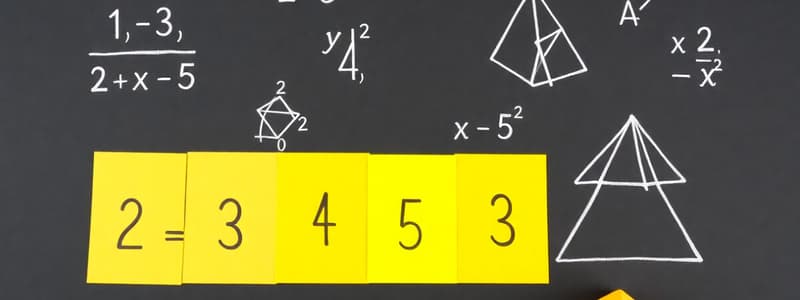Podcast
Questions and Answers
What is a fundamental characteristic of a function?
What is a fundamental characteristic of a function?
- It maps each input to a unique output. (correct)
- It describes a linear relationship only.
- It must always involve real numbers.
- It can have multiple outputs for a single input.
Why are formal logical systems essential in mathematics?
Why are formal logical systems essential in mathematics?
- They remove the need for proofs entirely.
- They focus exclusively on numerical methods.
- They provide only intuitive arguments.
- They allow for rigorous mathematical proofs. (correct)
What does a differential equation primarily describe?
What does a differential equation primarily describe?
- The relationship between two random variables.
- The constant quantity in a physical system.
- How a quantity changes over time. (correct)
- The statistical likelihood of an event.
What is the role of probability in mathematics?
What is the role of probability in mathematics?
What can be an outcome of solving complex differential equations?
What can be an outcome of solving complex differential equations?
Which of the following mathematical branches primarily deals with shapes and their properties?
Which of the following mathematical branches primarily deals with shapes and their properties?
What is the primary focus of algebra in mathematics?
What is the primary focus of algebra in mathematics?
Which statistical measure is NOT commonly used to describe central tendency?
Which statistical measure is NOT commonly used to describe central tendency?
What do key concepts of set theory primarily focus on?
What do key concepts of set theory primarily focus on?
In calculus, what does differential calculus primarily study?
In calculus, what does differential calculus primarily study?
Which of the following number systems encompasses both integers and fractions?
Which of the following number systems encompasses both integers and fractions?
What is one of the primary applications of integral calculus?
What is one of the primary applications of integral calculus?
Which of the following is NOT a basic operation in arithmetic?
Which of the following is NOT a basic operation in arithmetic?
Flashcards
Logical Reasoning
Logical Reasoning
It's a way of thinking that helps us build logical arguments and prove mathematical ideas.
What is a Function?
What is a Function?
A function relates inputs to outputs, giving you a single output for each input. Imagine a machine that takes something in and produces something out.
Differential Equations
Differential Equations
Differential equations show how things change over time, like the speed of a car or the growth of a population. They're often used in physics and engineering.
Probability
Probability
Signup and view all the flashcards
Formal Logical Systems
Formal Logical Systems
Signup and view all the flashcards
Arithmetic
Arithmetic
Signup and view all the flashcards
Algebra
Algebra
Signup and view all the flashcards
Geometry
Geometry
Signup and view all the flashcards
Calculus
Calculus
Signup and view all the flashcards
Statistics
Statistics
Signup and view all the flashcards
Set Theory
Set Theory
Signup and view all the flashcards
Number Systems
Number Systems
Signup and view all the flashcards
Mathematics
Mathematics
Signup and view all the flashcards
Study Notes
Core Mathematical Concepts
- Mathematics is a fundamental science concerned with numbers, quantity, structure, space, and change.
- It uses logical reasoning to deduce new facts from established truths, forming a complex system of interconnected concepts.
- Key areas of mathematics include arithmetic, algebra, geometry, calculus, and statistics.
Arithmetic
- Arithmetic deals with the basic operations of numbers (addition, subtraction, multiplication, and division).
- It is the foundation for more advanced mathematical concepts.
- Basic arithmetic skills are crucial in daily life for tasks like budgeting, measuring, and calculating.
Algebra
- Algebra uses symbols (often letters) to represent unknown numbers or variables.
- It uses equations and inequalities to describe relationships between quantities.
- It provides a powerful method for solving problems involving unknown values, focusing on general principles rather than specific numbers.
Geometry
- Geometry deals with shapes, sizes, positions, and relationships of objects in space.
- It uses postulates and theorems to derive properties of shapes and figures.
- Key aspects of geometry include plane geometry (2-dimensional shapes) and solid geometry (3-dimensional shapes).
Calculus
- Calculus is a branch of mathematics that deals with continuous change.
- It encompasses differential calculus (which studies rates of change) and integral calculus (which studies accumulations).
- Applications of calculus include computing areas, volumes, and lengths of curves, modelling motion, and optimizing functions.
Statistics
- Statistics involves collecting, organizing, analyzing, and interpreting numerical data.
- It uses techniques to summarize data, identify patterns, and make predictions.
- Common statistical measures include measures of central tendency (mean, median, mode) and measures of dispersion (range, variance, standard deviation).
Set Theory
- Set theory deals with collections of objects.
- It establishes axioms and rules for working with sets, enabling the study of infinite sets.
- A primary concept is the relationship between sets in terms of inclusion (subset) and equality.
Number Systems
- Number systems form the basis for representing quantities.
- Various number systems, including natural numbers, integers, rational numbers, and real numbers, exist.
- These systems are progressively more encompassing, extending to irrational numbers and complex numbers.
Logic
- Logical reasoning underlies mathematical proofs and deductions.
- Logic provides a framework for structuring arguments and establishing mathematical truths.
- Formal logical systems are essential for rigorous mathematical proofs.
Functions
- Functions describe relationships between sets of inputs and outputs.
- A function maps each input to a unique output.
- Functions are crucial in modeling real-world phenomena and solving mathematical problems.
Differential Equations
- Differential equations describe how a quantity changes over time.
- Solving differential equations can be complex and often involves advanced mathematical techniques.
- Differential equations have widespread applications in physics, engineering, and other fields.
Probability
- Probability describes the likelihood of an event occurring.
- It uses mathematical models to quantify uncertainty and make predictions.
- Probability is crucial for understanding random phenomena in various fields.
Studying That Suits You
Use AI to generate personalized quizzes and flashcards to suit your learning preferences.




